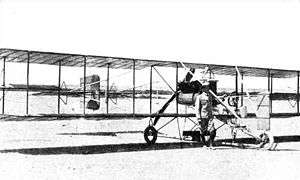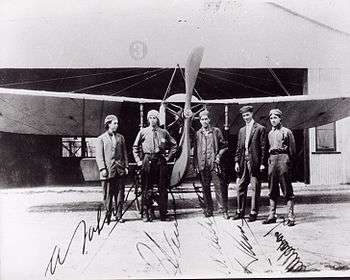Action of 9 April 1914
The Action of 9 April 1914 was an important turning point in naval and aviation history. On that date, one of the first naval/air skirmishes took place. This engagement took place off the coast of western Mexico during the Mexican Revolution. The action was part of the naval campaign off Topolobampo at the edge of the Gulf of California. A Constitutionalist biplane dropped bombs on two Huertista gunboats; they all missed.
| Action of 9 April 1914 | |||||||
|---|---|---|---|---|---|---|---|
| Part of the Mexican Revolution | |||||||
 Captain Camina and his biplane which attacked Guerrero and Morelos in Topolobampo Bay | |||||||
| |||||||
| Belligerents | |||||||
|
|
| ||||||
| Commanders and leaders | |||||||
| Captain Gustavo Salinas Camiña | Captain de Navío Torres | ||||||
| Strength | |||||||
| 1 biplane | 2 gunboats | ||||||
| Casualties and losses | |||||||
| none | none | ||||||
| |||||||

Background
After four engagements with the Federals, Lieutenant Hilario Malpica, of the gunboat Tampico, was awarded the rank of Captain, apparently by a Constitutionalist commander, General Álvaro Obregón. Tampico sat inside the bar at Topolobampo, partially sunk and blockaded. When President Francisco I. Madero took office, he sponsored five Mexicans to travel to Long Island, New York, to train as pilots at the Moisant International Aviators School. The "Famous Five" were Gustavo Salinas Camiña, Alberto Salinas Carranza, Horacio Ruiz Gaviño with two of his brothers, Juan Pablo Aldasoro and Eduardo Aldasoro Suárez. Camina would eventually be in service during the Mexican Revolution where he was summoned by General Obregon to break the blockade of Topolobampo.
Action
On April 9, 1914, Captain Camina lifted off from an airfield constructed behind Topolobampo for an attack run on the gunboats Guerrero and Morelos, which were under the command of Captain Torres of the Guerrero. Camina was armed with five explosives, which when dropped would detonate upon impact. He flew a Glenn L. Martin Company biplane. The Guerrero was armed with four 4 inch guns; it is not known what Morelos was armed with but most likely 4 inch guns as well. In addition, the crews of the gunboats had rifles and pistols. Captain Camina entered Topolobampo Bay, there he sighted the two Huertista gunboats at anchor. Little is known but Camina remained high in the air.
The aircraft was spotted by lookouts aboard Guerrero and Morelos, the crews were ordered to take up small arms and fire on the biplane. With shots whizzing by, Captain Camina continued his attack run until over the target, he quickly looked over the side and dropped the five bombs over the warships which were anchored close to each other. The bombs fell and Camina turned and headed for home. It is believed the rebel biplane was not hit by small arms fire. The bombs all failed to hit the target, although a couple did detonate near Guerrero. Captain Camina was too high in the sky to have a good chance of hitting the gunboats. Either way, the small engagement became one of the first naval actions involving aircraft.
Aftermath
The commanders of Guerrero and Morelos would be subsequently forced to abandon the blockade of Topolobampo, in order to resupply and coal their vessels. The end of the blockade gave Tampico a chance to take the fight to the federal gunboats. She would encounter only one, the Guerrero, at the final Fourth Battle of Topolobampo. Morelos would not participate, she was destroyed during the Siege of Mazatlan, where she ran aground in the harbor and over time was destroyed by both the rebel and federal forces.
See also
- Action of 17 February 1864
References
- Villard, Henry Serrano (1968) Contact! The Story of the Early Birds. New York: Thomas Y Crowell Company, as quoted on Ralph Cooper's website The Early Birds of Aviation on the page devoted to Moisant's Cross-Channel Flight, 1910.
- http://www.semar.gob.mx/informes/politicas_armada/parte_dos/capitulo_3.htm